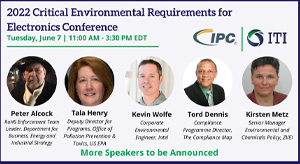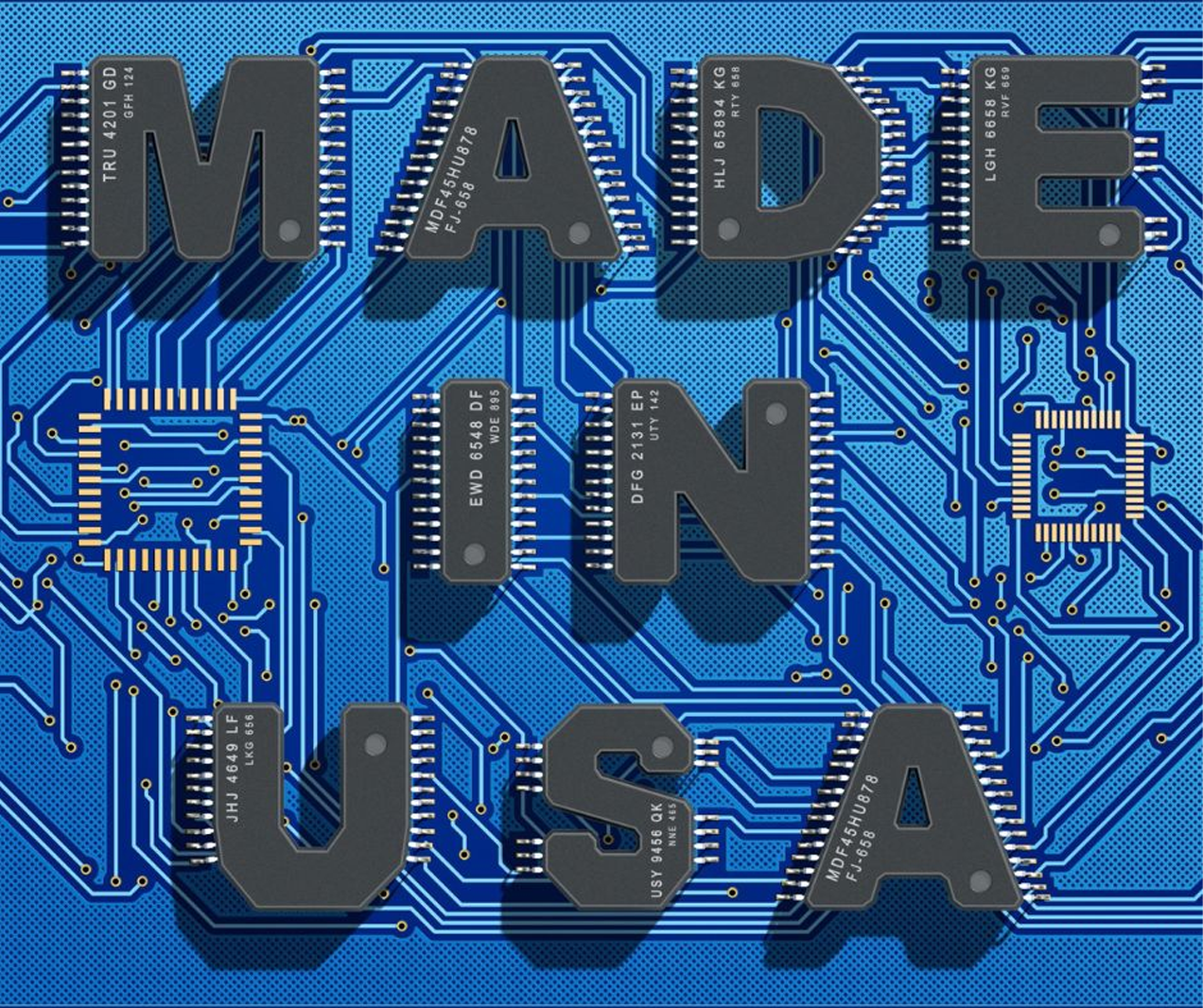 |
Dear IPC Members:
I hope this week’s newsletter finds you and yours doing well.
Here in Washington, D.C. we’re approaching a key juncture in policy discussions in the U.S. Congress affecting electronics manufacturing. As negotiations progress on a final version of the Bipartisan Innovation Act, we’re continuing to call for full funding for the CHIPS Act and advanced packaging research and development (R&D). If you haven’t already done so, please check out our active effort to ensure electronics are included in any initiatives to bolster U.S. manufacturing. |
Meanwhile, there are a host of opportunities for you to share your expertise with policy makers on environmental regulations in the U.S. and Europe. For further information, please see ENVIRONMENT AND HEALTH below or contact IPC Director of EHS Policy and Research Kelly Scanlon.
All the best,
Chris Mitchell
Vice President, Global Government Relations
The Headlines at a Glance:
TOP NEWS OF THE WEEK
- IPC Holds Call with Congressional Staff on Proposal to Boost U.S. PCB Sector
QUOTE OF THE WEEK
- IPC President and CEO John Mitchell Welcomes New IPC Europe Subsidiary
IPC ADVOCACY AND YOU
- A Robust U.S. Electronics Industry is in the National Interest!
ENVIRONMENT AND HEALTH
- Canada Proposes New Restrictions on Flame Retardants, Other EEE Substances
- Share Your Input on Commission’s Review of RoHS Directive
- EPA Reopens Comment Period on 20 Toxic Substances
- Commission Opens Consultation on New Regulation for Sustainable Products
EUROPEAN UNION
- Commission to Present Forced Labor Legislation by September
TRADE AND SUPPLY CHAIN
- U.S. Announces Major Indo-Pacific Trade Deal
- Geopolitical Uncertainty Affects Electronics Manufacturers Worldwide
UPCOMING EVENTS
- Join Experts at 2022 Critical Environmental Requirements for Electronics Conference
HELP US SPREAD THE WORD ON SOCIAL MEDIA
KEEP IN TOUCH WITH US
TOP NEWS OF THE WEEK
IPC Holds Call with Congressional Staff on Proposal to Boost U.S. PCB Sector: IPC convened a call this week for member company executives to speak with congressional staff on a bipartisan proposal in the U.S. Congress that would help bring back the U.S. printed circuit board (PCB) sector. We were pleased that Hill staff understood the need for legislation that would incentivize purchases of domestically produced PCBs as well as investments in factories, equipment, workforce training, and research and development (R&D). If also you agree with the need for this legislation, please visit the IPC Online Advocacy Center now and ask your Members of Congress to support the Supporting American Printed Circuit Boards Act of 2022. IPC Contact: Chris Mitchell.
QUOTE OF THE WEEK
 |
“While we have been actively engaged and successful in Europe for more than 30 years, having a legal entity here now enhances our ability to serve the regional electronics industry and our membership in newer and bolder ways with renewed vigor.”
– President and CEO John Mitchell comments on the formation of new subsidiary, IPC Electronics Europe GmbH. See what it means here.
|
IPC ADVOCACY AND YOU
A Robust U.S. Electronics Industry is in the National Interest: Encouraging the U.S. government to take a holistic approach to rebuilding its domestic electronics manufacturing ecosystem is the central theme of IPC’s IMPACT Washington Advocacy Campaign. If you agree, please visit the IPC Online Advocacy Center now to tell your Members of Congress to help secure federal support for the entire electronics supply chain. It only takes a minute and has a real impact! IPC Contact: Ken Schramko.
ENVIRONMENT & HEALTH
Canada Proposes New Restrictions on Flame Retardants, Other EEE Substances: Canada recently proposed a new regulation to prohibit the manufacture, use, sale, and import of two additive flame retardants used in a wide variety of electronic and electrical equipment (EEEs), including wire and cable jacketing. The regulation would also implement new restrictions on perfluorooctanoic (PFOA) and its related compounds. For more information, please read the regulatory impact analysis statement, let us know if you have any questions. IPC Contact: Kelly Scanlon.
Share Your Input on Commission’s Review of RoHS Directive: The European Commission recently opened a public consultation on the general review of the Restriction of Hazardous Substances (RoHS) Directive, including evaluation of the criteria and timelines for exemptions. The RoHS Directive, which aims to protect human health and the environment and maximize recovery of certain hazardous substances after their use, is one of the most important policies shaping electronics manufacturing. The deadline for comment is June 2. IPC will coordinate a response to this questionnaire, and we invite your engagement with us. IPC Contact: Kelly Scanlon.
EPA Reopens Comment Period on 20 Toxic Substances: The U.S. Environmental Protection Agency (EPA) has reopened the dockets for the 20 high-priority substances to undergo risk evaluation under the Toxic Substances Control Act (TSCA). This provides an additional opportunity for the electronics manufacturing industry to submit information that would help inform the risk evaluation processes for these chemicals, some of which have relevance to electronics manufacturing processes and products. The dockets are open until June 9. Please let us know if you are interested in this opportunity to inform future policy decisions. IPC Contact: Kelly Scanlon.
Commission Opens Consultation on New Regulation for Sustainable Products: The European Commission has opened a public consultation on a regulation that would repeal the existing Ecodesign Directive and establish a new framework for setting ecodesign requirements for sustainable products. The proposed regulation notably includes requirements for identifying substances of concern across a product’s life cycle and other information requirements, including a digital product passport. The consultation is open through June 22. IPC welcomes your feedback on the proposed regulation. IPC Contact: Kelly Scanlon.
EUROPEAN UNION
Commission to Present Forced Labor Legislation by September: The European Commission launched a call for evidence on May 24 indicating that upcoming legislation aimed at banning products made with forced labor will cover both EU and imported products and include a risk-based enforcement framework. Meanwhile, the European Parliament’s trade committee recently adopted a resolution calling for a World Trade Organization (WTO)-compatible instrument where importers must show the absence of forced labor in their products. The commission also confirmed that the forced labor legislation will be released by September. IPC Contact: Alison James.
TRADE AND SUPPLY CHAIN
 |
U.S. Announces Major Indo-Pacific Trade Deal: U.S. President Joe Biden announced a landmark economic deal among 13 countries on Monday to strengthen partnerships between the U.S. and Asian economies. The deal, called the Indo-Pacific Economic Framework (IPEF), aims to foster collaboration on issues including supply chains, digital trade, clean energy, and worker protections. IPC commends the framework and believes that all nations should work together to ensure the strength and resiliency of global supply chains for critical industries like electronics. Read the U.S. Government statement here. IPC Contact: Ken Schramko.
Geopolitical Uncertainty Affects Electronics Manufacturers Worldwide: According to the latest data from IPC, the electronics manufacturing supply chain continues to feel the effects of the Russia-Ukraine conflict, and it will take many months to fully determine its full effect. According to IPC’s May Economic Report, at least two other forces are exerting major pressures on our industry: inflation is pushing costs higher, and China’s strict COVID-19 policy are causing disruptions there. Meanwhile, IPC’s Global Sentiment Survey found that nine in ten electronics manufacturers are currently experiencing rising material costs, while nearly four-fifths are experiencing rising labor costs. IPC Contact: Ken Schramko.
UPCOMING EVENTS
Join Experts at 2022 Critical Environmental Requirements for Electronics Conference: Virtual, June 7. Join leading environmental regulatory experts at IPC and ITI’s virtual 2022 Critical Environmental Requirements for Electronics Conference on June 7 for key analysis on Toxic Substances Control Act (TSCA) risk evaluations and recordkeeping requirements, UK-based chemical and product policies, and the dynamic PFAS policy landscape. IPC Contact: Kelly Scanlon.
HELP US SPREAD THE WORD ON SOCIAL MEDIA
 |
|
 |
Join the U.K. Department for Business, Energy and Industrial Strategy (BEIS), U.S. Environmental Protection Agency (EPA), Intel, The Compliance Map, and other experts at IPC's and Information Technology Industry Council (ITI)'s virtual 2022 Critical Environmental Requirements for Electronics Conference on June 7. Register now. |
The introduction of the “Supporting American Printed Circuit Boards Act,” offered by Reps. Anna Eshoo (D-CA) and Blake Moore (R-UT), is a significant step to bolster the overlooked PCB sector. Now we must work together to promote its enactment. Please take a few minutes and head to IPC's Action Alert Center to contact your Members of Congress and urge them to support and cosponsor this bill. |
KEEP IN TOUCH WITH US
Meet the IPC GR Team: Whether it’s engaging with policymakers in Washington, D.C., in the European Union or in China, the IPC Government Relations (GR) Team proactively seeks opportunities to educate, inform and influence policymakers on policies that spur innovation, growth and competition, while protecting human health and the environment. But our success depends on your support and engagement. Learn more and get involved in IPC advocacy today! IPC Contact: Chris Mitchell.
Subscribe to IPC Global Advocacy Report: If you’re a member of IPC, manage your e-mail preferences and opt in to receive “Advocacy” updates. If you are not an IPC member — or you’re not sure — please send a note to friends@ipc.org, and our staff will add you to the list.
Follow us on Twitter and LinkedIn.
Contact one of us if you have any questions or insights to contribute.
See prior editions of Global Advocacy Report.
Explore our IPC Government Relations information online.
|
